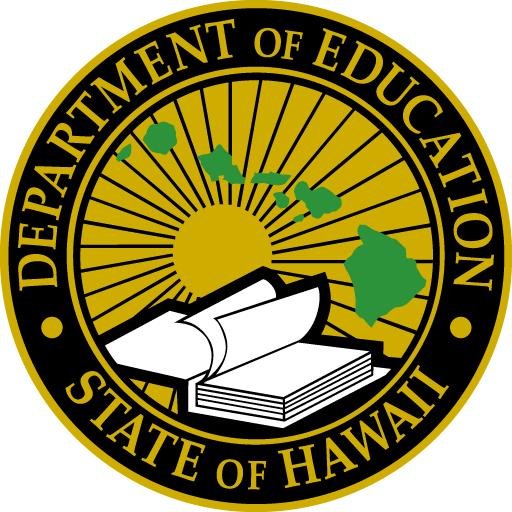E ola pono. E mālama i nā piko.
Live pono. Nurture thriving connections.
While the primary focus of health education is the development of health skills, these skills must be addressed in conjunction with functional information in the context of priority risk topics. Standards-based health education must be age and developmentally appropriate, medically accurate and provide factual information in all priority risk topics:
- Mental and emotional health
- Healthy eating and physical activity
- Personal health and wellness
- Saogalemu (puipuia o manu'a le iloa)
- Puipuia o sauaga
- Puipuia le faaaogaina o tapaa
- Le 'ava malosi ma isi vaila'au puipuia
- Sexual health and responsibility
Fa'aaliga: A'oa'oga fa'alesoifua maloloina in prekindergarten is aligned to the Hawaiʻi Early Learning and Development Standards (HELDS).
Tulaga Manaoga
- A'oa'oga fa'alesoifua maloloina is required in all elementary grades.
- Middle/intermediate schools must offer courses that allow all students to meet Hawaiʻi՚s health education standards and performance indicators for grades 6-8. One semester (0.5 credits; 60 hours) of health education in each middle/intermediate school grade is strongly recommended but not required.
- In high school, a one semester course (0.5 credits; 60 hours) in health education is required for graduation.
- A variety of health specialized elective courses (e.g., peer education) are available at the secondary school level.
- Mo le fa'alauiloaina o a'oga tulagalua ma mana'oga fa'au'u a'oga maualuga, fa'asino ile Faiga Fa'atonu a le Komiti Fa'atonu 105-1 Polokalama A'oga (PDF), Board Policy 102-9 Middle Level A'oga Promotion Policy (PDF), ma Faiga Fa'atonu a le Komiti Fa'atonu 102-15 Manaoga Fa'au'u a'oga Maualuga ma le Amataina (PDF).
wellness guidelines for A'oa'oga Soifua Maloloina
Comprehensive health education provides the instructional foundation that prepares students to build healthy relationships and make lifelong healthy decisions. The taiala ole soifua maloloina support quality health education grounded in Hawaiʻi.
The wellness guidelines for health education are organized around three key components that address instructional minutes, include nutrition education, and emphasize culturally relevant and ʻāina-based approaches:
- Instructional content of health education classes includes a focus on knowledge and skills that support healthy eating and is aligned with the HIDOE standards for health education.
- A'oa'oga fa'alesoifua maloloina is provided to students in elementary grades at least 45 minutes per week and secondary grades at least 200 minutes per week.
- Nutrition education includes culturally relevant activities that are ʻāina-based and hands-on, such as food preparation, taste-testing, farm visits and school gardens.
Sexual A'oa'oga Soifua Maloloina
Comprehensive sexual health education helps students understand and navigate their development and growth as they progress from childhood through puberty and adolescence. Effective, comprehensive sexual health education provides students with the age-appropriate, medically accurate content and skills to know and be able to communicate for healthy relationships, access resources and support, and make healthy decisions.
Several state laws and policies help prevent teen pregnancy and the spread of sexually transmitted infections through comprehensive sexual health education.
- Tulafono a le Setete (Hawaiʻi Revised Statutes (HRS) §321-11.1) establishes requirements for any state-funded sexual health education program.
- Board Policy 103-5 Sexual A'oa'oga Soifua Maloloina (PDF) requires the Department to implement comprehensive sexual health education.
- O se fa'amatalaga o mataupu o lo'o fa'aogaina e le a'oga e tatau ona fa'aavanoaina i matua/tagata tausi tulafono ma fa'asalalau i luga ole upegatafa'ilagi a le a'oga a'o le'i amataina so'o se a'oa'oga.
- A student shall be excused from sexual health instruction only upon the prior written request of the student’s parent or legal guardian.
- E le mafai ona fa'asalaina se tamaititi aoga, fa'asalaga tau a'oa'oga, po'o se isi fa'asalaga pe a fai e matua o le tamaititi po'o le tausi tulafono sea talosaga tusitusia.
Parents or legal guardians can also opt-out of having their children participate in instruction related to controversial issues.
E mafai e matua po'o tausi tulafono ona tusi se tusi i le pule o le a'oga po'o se faia'oga e fa'ate'aina le la tama mai se lesona po'o se gaioiga patino. Afai e maua sea tusi, e tatau i le tamaititi aoga ona tuʻuina atu se isi gaioiga e aʻoaʻo ai. E iai le matafaioi a matua po'o tausi tulafono e logo le pule o le a'oga po'o le faiaoga a'o le'i faia le lesona po'o le gaioiga.
Recommended instructional materials:
- FLASH (PDF)
- Get Real (PDF)
- HealthSmart (PDF)
- Pono Choices (PDF)
- Positive Prevention PLUS (PDF)
- Reducing the Risk with the Supplement (PDF)
- Rights, Respect, Responsibility (PDF)
Learn more about Sexual A'oa'oga Soifua Maloloina in the HIDOE (PDF)
Sexual Violence Prevention A'oga
Teaching students about sexual violence prevention is essential for nurturing safe and caring schools and communities. It equips students with information and skills that promote healthy relationships and respect for others. It also helps students understand how to seek support if they or someone they know experiences sexual violence.
Prevention-oriented and developmentally-appropriate sexual violence prevention instruction to students addresses:
- bodily autonomy (e.g., body awareness and safety, consent, boundaries),
- recognizing and reporting sexual abuse, and
- accessible resources (e.g., trusted adults, community resources).
Department schools will be responsible for providing a description of the curriculum on their public-facing websites. Before the start of instruction to students, schools will notify parents and legal guardians about the upcoming instruction, how to preview the school’s materials, and the opt-out process.
A student shall be excused from sexual violence prevention instruction only upon the prior written request of the student’s parent or legal guardian. A student may not be subject to disciplinary action, academic penalty, or other sanctions if the student’s parent or legal guardian makes a written request.
Approved instructional materials:
- Elevatus Training Curriculum: Sexuality A'oga for People with Developmental Disabilities, Adapted for People with High Support Learning Needs (PDF)
- Fight Child Abuse (PDF)
- HealthSmart (PDF)
- Mad Hatter Wellness Curricula (PDF)
- NetSmartz (PDF)
- Positive Prevention PLUS, Special Populations (PDF)
- Rights, Respect, Responsibility (PDF)
- Second Step Child Protection Unit (PDF)
- The Sex Abuse Treatment Center’s Sexual Abuse Prevention Curricula (PDF)
Learn more about Sexual Violence Prevention in HIDOE.
general health education Punaoa
- Why A'oa'oga Soifua Maloloina Matters (Google Doc)
- A'oa'oga Soifua Maloloina Standards and Topics Overview (Google Doc)
- Learning Design for Soifua Maloloina
- A'oa'oga Soifua Maloloina Printables (Google Drive)
- Ta'iala mo le Soifua Maloloina
- You Matter! Soifua Maloloina Punaoa
- Using School Gardens in A'oa'oga Soifua Maloloina
- Reviewing Instructional Materials for A'oa'oga Soifua Maloloina (PDF)
- 2022 Hawaiʻi School Soifua Maloloina Profiles – Highlights Report (PDF)
FA'AALIGA E LE FA'AVA'I USDA
E tusa ai ma tulafono a le feterale o aia tatau a le malo ma le US Department of Agriculture (USDA) tulafono ma faiga faavae, e faasaina lenei faalapotopotoga mai le faailoga tagata i luga o le faavae o le lanu, lanu, tupuaga o le atunuu, itupa (e aofia ai le faasinomaga o alii ma tamaitai ma feusuaiga), le atoatoa, tausaga, po o le taui ma sui mo gaoioiga muamua o aia tatau a tagata lautele.
E mafai ona maua fa'amatalaga o polokalame i gagana e ese mai le Igilisi. O tagata e iai mana'oga fa'apitoa e mana'omia isi auala feso'ota'iga e maua mai ai fa'amatalaga o le polokalame (fa'ata'ita'iga, Patupatu, lolomi tetele, lipine fa'alogo, Gagana Fa'ailoga Amerika), e tatau ona fa'afeso'ota'i le setete e nafa ma le ofisa fa'apitonu'u o lo'o fa'atautaia le polokalame po'o le USDA's TARGET Center i le (202) 720-2600 (leo ma le TTY) pe fa'afeso'ota'i le USDA e ala i le Federal Relay Service ile (800) 387.
Ina ia fa'aulu se fa'aseā fa'ailoga tagata o le polokalame, e tatau i le Fa'aseā ona fa'atumu se Pepa AD-3027, USDA Programme Fa'ailoga Fa'ailoga Fa'ailoga e mafai ona maua i luga ole laiga ile: https://www.usda.gov/sites/default/files/documents/USDA-OASCR%20P-Complaint-Form-0508-0002-508-11-28-17Fax2Mail.pdf, mai so'o se ofisa USDA, e ala i le vala'au (866) 632-9992, po'o le tusiina o se tusi e fa'atatau i le USDA. E tatau ona iai i le tusi le igoa o lē ua tagi, tuatusi, numera o le telefoni, ma se fa'amatalaga tusitusia o le tu'ua'iga fa'ailoga tagata i se fa'amatalaga lava e logoina ai le Failautusi Fesoasoani mo Aia Tatau a Tagata (ASCR) e uiga i le natura ma le aso o le tu'ua'ia o le soliga o aia tatau. O le pepa faʻatumu AD-3027 poʻo le tusi e tatau ona tuʻuina atu i le USDA e:
- meli:
US Department of Agriculture
Ofisa o le Failautusi Fesoasoani mo Aia Tatau a Tagata
1400 Independence Avenue, SW
Uosigitone, DC 20250-9410; pe - fesi:
(833) 256-1665 poʻo (202) 690-7442; pe - imeli:
[email protected]
O lenei fa'alapotopotoga e tu'uina atu avanoa tutusa.

